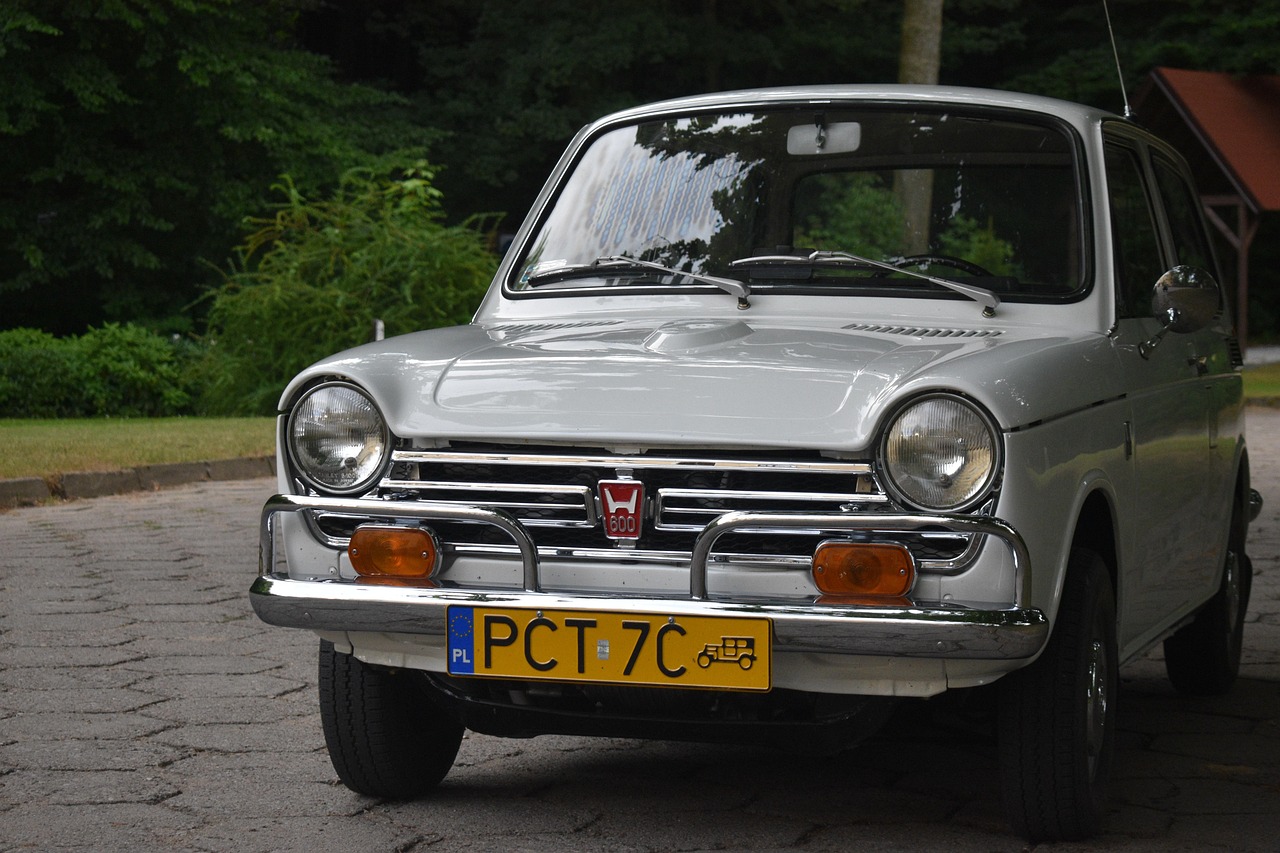This article provides essential tips and tricks for finding a reliable used Honda Civic. It covers everything from research to inspection, ensuring a successful purchase experience.
Understanding the Honda Civic’s Reputation
The Honda Civic has built a strong reputation for reliability and longevity, making it a favorite among used car buyers. Its consistent performance and low maintenance costs contribute to its status as a top choice in the compact car segment.
Researching the Right Model Year
When searching for a used Honda Civic, it’s crucial to understand that different model years offer varying features and performance capabilities. Researching which model years are known for their reliability can help you make an informed decision.
- Identifying Common Issues: Each model year may have specific issues. Familiarize yourself with common problems associated with various Honda Civic models to avoid potential pitfalls.
- Engine and Transmission Concerns: Look out for potential engine and transmission issues that could lead to costly repairs down the line.
- Interior and Electrical Problems: Inspect the interior for wear and check the electrical systems to ensure everything is functioning properly.
Checking Vehicle History Reports
Obtaining a vehicle history report is essential when purchasing a used car. This report provides insights into the car’s past, including accidents, title status, and service history, helping you assess its condition.
Setting a Realistic Budget
Budgeting is a key aspect of buying a used Honda Civic. Consider not only the purchase price but also additional costs such as insurance, maintenance, and fuel efficiency to create a comprehensive financial plan.
Finding Reliable Sellers
Choosing the right seller can significantly impact your buying experience. Whether you opt for a dealership or a private seller, weigh the pros and cons of each option to find a trustworthy source.
Inspecting the Vehicle Thoroughly
A thorough inspection is vital to uncover any hidden issues. Create a checklist to guide your inspection process, ensuring you cover all critical areas of the vehicle.
- Test Driving the Honda Civic: Evaluate the car’s performance during a test drive. Pay attention to how it handles, accelerates, and brakes.
- Seeking Professional Inspections: Consider hiring a mechanic for a pre-purchase inspection. Their expertise can provide peace of mind and reveal any underlying problems.
Negotiating the Price
Effective negotiation can lead to a better purchase price. Understand the fair market value of the Honda Civic to strengthen your position during negotiations.
- Making a Fair Offer: Present a reasonable offer based on your research and the car’s condition. Confidence in your offer can lead to successful negotiations.

Understanding the Honda Civic’s Reputation
The Honda Civic has earned a stellar reputation in the automotive world, particularly among used car buyers. Its reliability and longevity are often cited as key reasons for its popularity. This section delves into the various factors that contribute to the Civic’s esteemed status, making it a top choice for those in the market for a used vehicle.
- Proven Engineering: The Honda Civic is built with precision engineering that emphasizes durability. Honda’s commitment to quality control ensures that each model is rigorously tested before it reaches the market.
- Fuel Efficiency: With rising fuel prices, the Civic stands out due to its impressive fuel economy. Many models achieve excellent miles per gallon (MPG), making them economical choices for daily commuting.
- Low Maintenance Costs: The Civic is known for requiring fewer repairs compared to other vehicles in its class. This characteristic translates to lower ownership costs over time, which is a significant advantage for used car buyers.
- Strong Resale Value: The Honda Civic maintains its value exceptionally well, which is a testament to its reliability. This quality makes it a wise investment for buyers who may consider selling or trading in their vehicle in the future.
- Community and Support: A large community of Honda enthusiasts and a wealth of online resources make it easier for owners to find support, parts, and advice, enhancing the ownership experience.
Additionally, the Civic’s reputation is bolstered by numerous awards and accolades over the years, including high safety ratings and commendations for customer satisfaction. These factors collectively solidify the Honda Civic’s position as a trusted choice for used car buyers, ensuring they can purchase a vehicle that not only meets their needs but also stands the test of time.

Researching the Right Model Year
When considering the purchase of a used Honda Civic, it is essential to understand that different model years offer a variety of features and performance levels. This section aims to guide potential buyers in identifying which model years are the most reliable and best suited to their individual needs.
Honda Civics have evolved significantly over the years, with each generation introducing improvements and updates. Key factors to consider when researching model years include:
- Performance: Engine options, horsepower, and fuel efficiency can vary widely between model years. For instance, the 2016 model introduced a turbocharged engine that significantly improved performance.
- Safety Features: Advancements in safety technology, such as collision warning systems and lane-keeping assist, were incorporated in later models, making them safer choices for families.
- Interior Quality: The materials and technology inside the car have improved over the years, with newer models featuring upgraded infotainment systems and more comfortable seating.
- Reliability Ratings: Researching reliability ratings from sources like Consumer Reports can highlight which model years have the best track records.
It’s also important to be aware of common issues associated with specific model years. For example, earlier models may have known transmission problems, while newer models might face electrical issues. Understanding these nuances can save buyers from costly repairs down the line.
To make an informed decision, buyers should utilize resources such as online forums, automotive reviews, and expert articles. Engaging with current Honda Civic owners can also provide valuable insights into the experience of living with different model years.
In summary, thorough research into the various model years of the Honda Civic is crucial for making a wise purchase. By focusing on reliability, features, and owner experiences, buyers can find a model that meets their needs and preferences.
Identifying Common Issues
When considering the purchase of a used Honda Civic, it is essential to be aware of common issues that may arise with different model years. Each generation of the Civic has its own set of characteristics, and understanding these can help buyers make informed decisions.
Honda Civic Model Year Issues
| Model Year | Common Problems |
|---|---|
| 2001-2005 | Transmission failure and engine stalling issues |
| 2006-2011 | Excessive oil consumption and faulty air conditioning |
| 2012-2015 | Transmission jerking and electrical system failures |
| 2016-2021 | Infotainment glitches and premature brake wear |
Each of these issues can vary in severity, making it crucial for potential buyers to conduct thorough research. For instance, the 2001-2005 Honda Civics are often reported to have significant transmission failures, which can lead to costly repairs. Additionally, buyers should be wary of the 2006-2011 models, which have a reputation for excessive oil consumption and issues with the air conditioning system.
Furthermore, the 2012-2015 Honda Civics may experience transmission jerking and electrical problems, which could affect overall driving experience and safety. Lastly, the most recent 2016-2021 models are noted for infotainment glitches and premature brake wear, which can be frustrating for users.
By understanding these common issues associated with various Honda Civic models, buyers can better prepare themselves for what to expect and ensure they are making a well-informed purchase. Always consider obtaining a comprehensive vehicle history report and consulting with a trusted mechanic to further mitigate risks.
Engine and Transmission Concerns
When considering a used Honda Civic, it’s essential to be aware of potential engine and transmission issues that could arise. These concerns can lead to significant repair costs if not identified early. Below, we delve into the most common problems associated with these critical components, helping buyers to make informed decisions.
- Engine Oil Leaks: One of the most prevalent issues in older Honda Civics is engine oil leaks. Look for signs of oil pooling under the vehicle or oil stains on the engine block. Regular maintenance can mitigate this issue, but it’s vital to check for leaks during your inspection.
- Overheating: Overheating can be a serious problem, often caused by a malfunctioning thermostat or a failing water pump. Ensure that the temperature gauge functions correctly during your test drive, and listen for unusual noises that may indicate cooling system failures.
- Transmission Slipping: A slipping transmission can lead to a lack of power and difficulty in shifting gears. Pay attention to how smoothly the car accelerates and shifts during your test drive. If you experience any hesitation, it may be a sign of transmission trouble.
- Check Engine Light: If the check engine light is illuminated, it could indicate various issues, from minor to severe. Always request a diagnostic report to understand the underlying problems before proceeding with the purchase.
- Clutch Wear: For manual transmission models, excessive clutch wear can lead to difficulties in gear engagement. Test the clutch during your drive to ensure it engages smoothly without any grinding or slipping.
By being vigilant about these engine and transmission concerns, you can significantly reduce the risk of unexpected repair costs and ensure a more reliable driving experience. Taking the time to inspect these components thoroughly will ultimately lead to a smarter purchase decision.
Interior and Electrical Problems
When considering the purchase of a used Honda Civic, it is essential to conduct a thorough inspection of the interior and electrical systems. These aspects are often overlooked but can significantly impact the vehicle’s overall performance and comfort. Below are key areas to focus on during your inspection:
- Interior Wear and Tear: Check for signs of wear on the seats, dashboard, and carpeting. Look for any stains, tears, or discoloration that may indicate neglect or excessive use.
- Functionality of Controls: Test all interior controls, including the air conditioning, heating, and infotainment system. Ensure that buttons and knobs operate smoothly without any sticking or malfunctioning.
- Electrical System Check: Inspect the vehicle’s electrical components, including headlights, taillights, and turn signals. Verify that all lights function correctly, as faulty electrical systems can lead to safety hazards.
- Power Accessories: If the Honda Civic has power windows, locks, or mirrors, test each one to ensure they operate without issues. Malfunctions in these areas can indicate larger electrical problems.
- Sound System Inspection: Listen to the audio system during your test drive. Check for any distortion or malfunction in the speakers, which can be a sign of electrical problems.
- Dashboard Warning Lights: Pay attention to any warning lights illuminated on the dashboard. These alerts can indicate underlying issues that may require immediate attention.
By focusing on these critical areas, potential buyers can better assess the condition of a used Honda Civic, ensuring it meets their quality standards and is free from costly repairs down the line.
Checking Vehicle History Reports
When it comes to purchasing a used Honda Civic, one of the most important steps is checking the vehicle history report. This report provides invaluable information about the car’s past, helping you make an informed decision. Here’s how you can obtain and interpret these reports effectively.
How to Obtain a Vehicle History Report
- Visit reputable websites such as Carfax or AutoCheck. These platforms offer comprehensive reports for a fee.
- Request the report from the seller. Many responsible sellers will provide a vehicle history report upfront, which can save you time and money.
- Use the Vehicle Identification Number (VIN) to access the report. The VIN is typically located on the dashboard, near the windshield, or on the driver’s side door frame.
Interpreting the Vehicle History Report
Once you have the report, understanding its contents is crucial:
- Accident History: Look for any reports of accidents. A history of major collisions can indicate potential structural issues.
- Title Status: Ensure the title is clean. A salvage title may suggest significant damage or previous insurance claims.
- Service Records: Check for regular maintenance and service records. A well-maintained Honda Civic is likely to be more reliable.
- Ownership History: Fewer owners generally indicate a more stable vehicle history. Multiple owners in a short time may raise red flags.
Why Vehicle History Reports Matter
Investing in a vehicle history report is a small price to pay for peace of mind. Understanding the car’s past can help you avoid costly repairs and ensure you are making a wise investment in your used Honda Civic.

Setting a Realistic Budget
is a crucial step when considering the purchase of a used Honda Civic. Establishing a budget not only involves the initial cost of the vehicle but also encompasses various additional expenses that can arise throughout the ownership experience. This section aims to provide a comprehensive guide to help buyers create a well-rounded budget.
When calculating your budget, start with the purchase price of the Honda Civic. Research the average market price for the specific model year you are interested in, as prices can vary significantly based on mileage, condition, and location. Utilize online resources such as Kelley Blue Book or Edmunds to gauge the fair market value.
Next, consider taxes and fees. Depending on your location, sales tax can add a substantial amount to the total cost. Additionally, there may be registration fees and other administrative costs that you should factor into your budget. It’s wise to check with your local Department of Motor Vehicles (DMV) for accurate fee structures.
Another important aspect is to account for potential repairs and maintenance. While Honda Civics are known for their reliability, it’s prudent to set aside funds for unforeseen repairs. A good rule of thumb is to allocate around 10-15% of the purchase price for immediate maintenance needs, such as new tires or brake replacements.
- Insurance Costs: Don’t forget to include insurance premiums in your budget. Research different insurance providers to find the best rates for your Civic.
- Fuel Efficiency: Consider the vehicle’s fuel economy. The Honda Civic is generally fuel-efficient, but estimating your monthly fuel costs can help you plan better.
- Routine Maintenance: Budget for regular maintenance services, such as oil changes and tire rotations, to keep your Civic running smoothly.
By carefully considering these factors, you can establish a realistic budget that not only covers the purchase price but also prepares you for ongoing ownership costs. This thoughtful approach will ensure that your investment in a used Honda Civic is both financially sound and rewarding.
Considering Additional Costs
When purchasing a used Honda Civic, it is crucial to consider more than just the initial purchase price. Buyers should be aware of various additional costs that can impact their overall budget significantly. This section delves into three key areas: insurance, maintenance, and fuel efficiency, providing essential insights for prospective buyers.
- Insurance Costs: The cost of insuring a Honda Civic can vary based on factors such as the driver’s age, location, and driving history. Typically, Civics are known for being relatively affordable to insure due to their reputation for safety and reliability. However, it is advisable to obtain quotes from multiple insurance providers to find the best rate that fits your budget.
- Maintenance Expenses: While Honda Civics are renowned for their durability, regular maintenance is essential to keep the vehicle running smoothly. Common maintenance tasks include oil changes, brake inspections, and tire rotations. Setting aside a budget for these routine services can help prevent unexpected expenses down the road. Additionally, consider the potential costs of replacing parts, especially if the vehicle is older.
- Fuel Efficiency: One of the standout features of the Honda Civic is its fuel efficiency. Depending on the model year and engine type, Civics can achieve impressive miles per gallon (MPG), which can lead to significant savings on fuel costs over time. When evaluating a used Civic, check the EPA ratings for the specific model to understand its fuel consumption and how it aligns with your driving habits.
Understanding these additional costs is essential for making an informed decision when purchasing a used Honda Civic. By planning for insurance, maintenance, and fuel efficiency, buyers can ensure a more accurate financial assessment and avoid unexpected financial burdens in the future.
Finding Reliable Sellers
When it comes to purchasing a used Honda Civic, is a crucial step that can significantly impact your buying experience. The seller you choose can influence not only the price but also the overall condition and reliability of the vehicle. This section will delve into the different types of sellers available, including dealerships and private sellers, along with their respective advantages and disadvantages.
- Dealerships:
- Pros:
- Often provide certified pre-owned vehicles, which come with warranties.
- Have a more extensive selection of vehicles to choose from.
- May offer financing options and trade-in deals, making the purchasing process smoother.
- Cons:
- Typically have higher prices due to overhead costs.
- Sales tactics can be aggressive, which may pressure buyers.
- Pros:
- Private Sellers:
- Pros:
- Often offer lower prices compared to dealerships.
- Can provide a more personal buying experience and direct communication.
- Cons:
- May not offer any warranties or guarantees, leading to potential risks.
- Less recourse available if issues arise after the sale.
- Pros:
Ultimately, the choice between a dealership and a private seller depends on your individual preferences, budget, and comfort level with the purchasing process. Whether you opt for the security of a dealership or the savings of a private seller, conducting thorough research and asking the right questions will help ensure that you make a well-informed decision.

Inspecting the Vehicle Thoroughly
When purchasing a used Honda Civic, a thorough inspection is crucial to ensure you are making a wise investment. A detailed check can reveal hidden issues that might not be immediately apparent, potentially saving you from costly repairs down the line. Below is a comprehensive checklist to guide you through the inspection process before finalizing your purchase.
| Inspection Area | What to Look For |
|---|---|
| Exterior Condition | Check for dents, scratches, and rust. Ensure the paint matches across the vehicle. |
| Interior Condition | Inspect seats for wear and tear, check the functionality of buttons, and ensure the air conditioning works. |
| Engine Bay | Look for leaks, corrosion, and the condition of belts and hoses. Check the oil level and its quality. |
| Tires | Examine tire tread depth and even wear. Ensure all tires are in good condition and match. |
| Brakes | Test brake responsiveness during a test drive. Listen for unusual noises when braking. |
| Lights and Signals | Confirm that all headlights, taillights, and turn signals are functioning properly. |
| Suspension | Check for any unusual noises when driving over bumps and ensure the car rides smoothly. |
In addition to this checklist, consider bringing a friend or family member along for a second opinion during the inspection. Their perspective can be invaluable. Furthermore, if you are uncertain about any aspect of the vehicle’s condition, do not hesitate to seek a professional mechanic for a comprehensive evaluation. This step can provide you with peace of mind and confidence in your purchase.
By following this checklist and being diligent in your inspection, you can significantly increase your chances of acquiring a quality used Honda Civic that meets your needs and expectations.
Test Driving the Honda Civic
When considering the purchase of a used Honda Civic, test driving the vehicle is an essential step in evaluating its overall performance and condition. This hands-on experience allows potential buyers to assess various aspects of the car, ensuring it meets their expectations before committing to a purchase.
- Engine Performance: Pay attention to how the engine responds when accelerating. A smooth transition without any hesitation or unusual noises indicates a healthy engine. Listen for any knocking or grinding sounds, which could signal underlying issues.
- Transmission Functionality: Whether it’s an automatic or manual transmission, ensure that gear shifts are seamless. Test the car in different driving conditions, such as accelerating from a stop and cruising at higher speeds, to check for any slippage or rough shifts.
- Steering and Handling: Evaluate the steering response by taking sharp turns and navigating through curves. The steering should feel precise and responsive, without any vibrations or pulling to one side. A well-maintained Honda Civic should handle smoothly and confidently.
- Braking System: Test the brakes by applying them at various speeds. They should engage smoothly without any grinding noises or vibrations. A soft or spongy brake pedal may indicate issues with the braking system, which should be addressed before purchase.
- Suspension and Ride Comfort: Drive over bumps and uneven surfaces to assess the suspension’s performance. A good suspension will absorb shocks effectively, providing a comfortable ride without excessive bouncing or noise.
- Interior Features: While driving, take the time to test the functionality of interior features such as the air conditioning, radio, and navigation system. Ensure that all controls are user-friendly and operate as expected.
In summary, a thorough test drive of the Honda Civic not only helps you evaluate its performance but also gives you a feel for the vehicle’s overall comfort and suitability for your needs. Always remember to take your time during this process, as it can be a decisive factor in your purchasing decision.
Seeking Professional Inspections
When it comes to purchasing a used Honda Civic, ensuring the vehicle’s condition is paramount. One of the most effective ways to achieve this is by hiring a professional mechanic for a pre-purchase inspection. This process not only provides you with peace of mind but also helps in uncovering potential issues that could lead to costly repairs down the road.
A professional inspection offers numerous benefits. First and foremost, mechanics have the experience and expertise to identify problems that an untrained eye might miss. They will thoroughly assess the vehicle’s engine, transmission, brakes, and suspension, ensuring that everything is functioning correctly. Additionally, they can provide insights into the car’s maintenance history, which is crucial for understanding how well the vehicle has been cared for.
During a pre-purchase inspection, you can expect the following:
- Comprehensive Assessment: Mechanics will examine the car from top to bottom, checking for signs of wear and tear, rust, or any previous accidents.
- Diagnostic Testing: Many professionals use specialized tools to conduct diagnostic tests, revealing issues that may not be visible during a standard inspection.
- Detailed Report: After the inspection, you will receive a detailed report outlining any findings, which can be an invaluable tool in your negotiation process.
- Expert Recommendations: Based on their findings, mechanics can offer advice on whether to proceed with the purchase or to look for other options.
Investing in a pre-purchase inspection is a small price to pay for the peace of mind it provides. It empowers you as a buyer, ensuring that you make an informed decision about your investment. Remember, a reliable Honda Civic can serve you well for years, but only if it is in good condition. Don’t skip this essential step in your car-buying journey!

Negotiating the Price
of a used Honda Civic is a crucial step that can lead to substantial savings. Mastering the art of negotiation can empower buyers to secure a better deal, making the overall purchase experience more satisfying.
Before entering negotiations, it’s essential to conduct thorough market research. Understanding the average price range for the specific model year and trim level you are interested in can provide a solid foundation for your negotiation strategy. Websites like Kelley Blue Book and Edmunds can be invaluable resources for determining the fair market value of the vehicle.
Once you have established a price range, consider the following strategies:
- Start Low but Reasonable: Begin your negotiation with an offer that is lower than the asking price but still within a reasonable range. This tactic gives you room to negotiate upwards while still aiming for a favorable outcome.
- Highlight Vehicle Flaws: If you notice any imperfections during your inspection, such as minor scratches or mechanical issues, use these as leverage to justify your offer. Pointing out these flaws can help the seller see the need for a price adjustment.
- Be Prepared to Walk Away: One of the most powerful tools in negotiation is the willingness to walk away. If the terms aren’t favorable, expressing your readiness to leave can prompt the seller to reconsider their stance.
- Stay Calm and Polite: Maintaining a calm and respectful demeanor can foster a more productive negotiation environment. Aggressive tactics can lead to resistance and may hinder the negotiation process.
Finally, once an agreement is reached, ensure all terms are clearly documented. This includes the final price, any repairs or services promised, and the payment method. A well-documented agreement protects both parties and ensures a smoother transaction.
Understanding Market Value
When it comes to negotiating the price of a used Honda Civic, understanding its fair market value is essential. This knowledge equips buyers with the necessary tools to engage in effective discussions with sellers, ensuring they do not overpay for their vehicle. In this section, we will explore various resources and methods to accurately determine the market value of a Honda Civic.
- Online Valuation Tools: Websites like Kelley Blue Book, Edmunds, and NADA Guides offer comprehensive tools that allow potential buyers to input specific details about the Honda Civic they are interested in. By entering the model year, mileage, condition, and optional features, buyers can receive an estimated market value tailored to their specific vehicle.
- Comparative Market Analysis: Another effective way to gauge the market value is by conducting a comparative analysis. This involves researching similar Honda Civic models currently listed for sale in your area. By comparing prices, mileage, and condition, buyers can get a clearer picture of what constitutes a fair price.
- Local Classifieds and Dealership Listings: Browsing local classifieds, such as Craigslist or Facebook Marketplace, can provide insight into what sellers are asking for similar vehicles. Additionally, visiting local dealerships can reveal pricing trends and give buyers an idea of what to expect.
- Consulting Automotive Experts: Engaging with automotive experts or forums can provide valuable insights. Experienced mechanics or enthusiasts often have a wealth of knowledge regarding the Honda Civic’s market value and can offer guidance on fair pricing based on the vehicle’s condition and history.
By utilizing these resources, buyers can confidently approach negotiations, armed with the knowledge of what a Honda Civic is truly worth. This preparation not only enhances the buying experience but also ensures that buyers make informed decisions, ultimately leading to a successful purchase.
Making a Fair Offer
When it comes to purchasing a used Honda Civic, is a crucial step that can significantly influence the outcome of your negotiations. Here are some tips to help you present your offer to the seller with confidence and clarity.
- Do Your Homework: Before making an offer, research the market value of the specific model year you are interested in. Utilize online resources such as Kelley Blue Book or Edmunds to compare prices based on the car’s condition, mileage, and location.
- Assess Vehicle Condition: Inspect the Honda Civic thoroughly. Take note of any cosmetic damage, mechanical issues, or signs of wear. This information will empower you to justify your offer, especially if you find areas that may require repairs.
- Set a Budget: Determine your maximum budget before negotiations begin. This will help you stay focused and avoid overspending. Make sure to include potential costs for repairs or upgrades in your overall budget.
- Start Lower: It’s often advisable to start your offer lower than what you are willing to pay. This gives you room to negotiate upwards while still aiming for a price that feels fair to both you and the seller.
- Communicate Clearly: When presenting your offer, be straightforward and respectful. Explain how you arrived at your offer based on your research and the vehicle’s condition. This transparency can foster trust and facilitate a smoother negotiation process.
- Be Prepared to Compromise: Negotiations often involve give and take. Be open to the seller’s counteroffer and consider what terms can make the deal more appealing without exceeding your budget.
By following these guidelines, you can craft a reasonable offer that not only reflects the value of the Honda Civic but also positions you as a serious and informed buyer. This approach can lead to successful negotiations and a satisfying purchase experience.
Frequently Asked Questions
- What should I look for when inspecting a used Honda Civic?
When inspecting a used Honda Civic, pay attention to the exterior for any signs of rust or damage. Check the tires for wear, and inspect the interior for any unusual wear and tear. Don’t forget to test all the electrical components, like the lights and infotainment system, to ensure everything is functioning properly.
- How can I find a reliable seller for a used Honda Civic?
Finding a reliable seller can make all the difference! Look for established dealerships with good reviews, or check online platforms that offer buyer protection. Don’t hesitate to ask for the vehicle’s history and maintenance records to ensure you’re dealing with a trustworthy seller.
- What are common issues with specific Honda Civic model years?
Each model year can have its quirks! For example, older models may have transmission issues, while newer ones might face electrical problems. Doing your research on the specific year you’re interested in can help you avoid potential headaches down the road.
- Is a vehicle history report really necessary?
Absolutely! A vehicle history report provides crucial information about previous accidents, title status, and service history. This can help you avoid purchasing a car with hidden problems, making it a smart investment in your peace of mind.
- How do I negotiate the price of a used Honda Civic?
Negotiating can feel daunting, but it’s key to getting a good deal! Start by researching the fair market value of the model you’re interested in. Present your offer confidently, and be prepared to justify it with any issues you found during your inspection or the vehicle’s history report.



